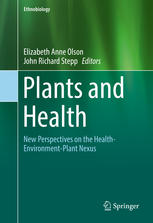

Most ebook files are in PDF format, so you can easily read them using various software such as Foxit Reader or directly on the Google Chrome browser.
Some ebook files are released by publishers in other formats such as .awz, .mobi, .epub, .fb2, etc. You may need to install specific software to read these formats on mobile/PC, such as Calibre.
Please read the tutorial at this link. https://ebooknice.com/page/post?id=faq
We offer FREE conversion to the popular formats you request; however, this may take some time. Therefore, right after payment, please email us, and we will try to provide the service as quickly as possible.
For some exceptional file formats or broken links (if any), please refrain from opening any disputes. Instead, email us first, and we will try to assist within a maximum of 6 hours.
EbookNice Team

Status:
Available5.0
35 reviewsThis volume showcases current ethnobiological accounts of the ways that people use plants to promote human health and well-being. The goal in this volume is to highlight some contemporary examples of how plants are central to various aspects of healthy environments and healthy minds and bodies. Authors employ diverse analytic frameworks, including: interpretive and constructivist, cognitive, political-ecological, systems theory, phenomenological, and critical studies of the relationship between humans, plants and the environment. The case studies represent a wide geographical range and explore the diversity in the health appeals of plants and herbs. The volume begins by considering how plants may intrinsically be ‘healthful’ and the notion that ecosystem health may be a literal concept used in contemporary efforts to increase awareness of environmental degradation. The book continues with the exploration of the ways in which medically-pluralistic societies demonstrate the entanglements between the environment, the state and its citizens. Profit driven models for the extraction and production of medicinal plant products are explored in terms of health equity and sovereignty. Some of the chapters in this volume work to explore medicinal plant knowledge and the globalization of medicinal plant knowledge. The translocal and global networks of medicinal plant knowledge are pivotal to productions of medicinal and herbal plant remedies that are used by people in all variety of societies and cultural groups. Humans produce health through various means and interact with our environments, especially plants, in order to promote health.
The ethnographic accounts of people, plants, and health in this volume will be of interest to the fields of anthropology, biology and ethnobiology, as well as allied disciplines.